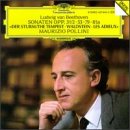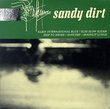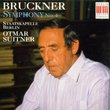| All Artists: Ludwig van Beethoven, Maurizio Pollini Title: Beethoven: Piano Sonatas Nos. 17, 21, 25, 26 Members Wishing: 0 Total Copies: 0 Label: Dg Imports Release Date: 9/13/1989 Album Type: Import Genre: Classical Styles: Forms & Genres, Sonatas, Historical Periods, Classical (c.1770-1830), Romantic (c.1820-1910) Number of Discs: 1 SwapaCD Credits: 1 UPC: 028942764224 |
Search - Ludwig van Beethoven, Maurizio Pollini :: Beethoven: Piano Sonatas Nos. 17, 21, 25, 26
 | Ludwig van Beethoven, Maurizio Pollini Beethoven: Piano Sonatas Nos. 17, 21, 25, 26 Genre: Classical
|
Larger Image |
CD DetailsSimilar CDs
|
CD ReviewsPollini's Beethoven - something that digitisation cannot gra Abel | Hong Kong | 07/06/2009 (5 out of 5 stars) "This recital of middle-period Beethoven sonatas really tops the list - Kempff, Gillels, Gulda, Arrau, Gould... The reason is quite simple. Pollini's vision of Beethoven's sonatas is utterly unique, and he is fully capable of transimitting his well-founded and profound vision into his playing. The pianoforte is transformed into a keyboard orchestra, and the different parts for different instruments playing their way under well-nigh super-human pianism in a composite whole; more composite than any conductor could ever manage. Pollini's dynamics have much more depth than any other pianist listed above as a result of his super-power touching. The pianisimos are all there, fully audible, while the fortisimos roar in utmost thunder. His tempi are also nerve-wrecking, bringing out the wildest side of Beethoven's all too often underplayed music. Of all the pianists listed above, Friedrich Gulda comes closest to Pollini in terms of bringing out the deeply disturbing nature of these works; but Gulda's preference of a Borsendorfer in his recordings vastly limited his power of expression in terms of dynamics. The ONLY drawback is, as one reviewer so succintly pointed out, the recorded sound. Pollini's Beethoven sonatas are difficult to record, though. Alas, the era of LPs served him vastly better than digitisation. " 'The Tempest' alone is worth the price of this recording. A. F. S. Mui | HK | 06/22/2009 (5 out of 5 stars) "What a lark! I've been listening to and playing this piece for more than 40 years. Brendel did a clinically precise performance in his recordng with Philips. But his hasn't got much poetry or prowess, much as I admire Brendel for his Mozart. His Beethoven simply isn't quite on par (as is his Schubert) with some other top players in the field. Kempff's isn't that exciting either, but does have in store a fair amount of poetry. Gillels' is a big rendition, but Pollini here matches Gillels' point by point, and exceeds Gillels' in terms of poetic expression. If you want to listen to a 'breakneck' speed of Beethoven sonatas, go for Friedrich Gulda's second cycle now available on Brilliant Classics, in which mOST of the pieces were played at very fast pace. Even so, speed has nothing to deter a good interpretation of Beethoven if you are a real virtuoso like Gulda or Pollini. Beethoven's works CAN be played at great speed without any detraction from the score's requirements." This repertoire suits Pollini well Daniel Pi | Minnesota | 02/17/2010 (5 out of 5 stars) "For those who don't know Pollini, he is the paragon of "universalism". He is reliably "very good" at a minimum, and occasionally brilliant. His razor-precise accuracy, consummate rhythmic drive, and tendency toward clarity make him well-suited for nearly anything you put in front of him. In particular, he seems to pay an in incredible amount of care and attention to voicing, and on that particular technical point, he is second to none. He always seems to delineate a clear "melodic" line, without any sort of sentimentalizing or other such nonsense.
Of course, Bach and Beethoven are frequently troublesome for non-specialists, because they require a rather particular approach, confounding the otherwise portable talents of "universalists" like Pollini. To wit, I would classify Pollini's recent Bach effort in the "good enough but not great" category. He just applies his generic polish and shine to the notes that Bach wrote, without really giving us very many new ideas. Standard tempos, standard articulation, standard everything. And I'm inclined to think that Pollini's Beethoven is also GENERALLY a weakness, though one yearns to have weaknesses so brilliant as Pollini's. The exception then is THIS disc. To dig in a bit deeper, I am always surprised how disappointing the Waldstein and Tempest sound when played by otherwise brilliant Beethoven specialists. I'm thinking of Brendel, Kempff, Arrau, and Serkin, who are all brilliant in their other Beethoven efforts, but for whom these pieces seem to pose a unique challenge. I won't speculate too much on why this might be, but as a quick guess, I think the Tempest and Waldstein are deceptively episodic. That is, upon inspection, it seems that they have the sort of episodic form that Beethoven employed in many of his later Sonatas (note: the Tempest and Waldstein are "middle period"). However, it seems to me that they require more of a single-affect approach. Like a Bach prelude or invention or something along those lines. That is, they seem to want for a degree of "flattening out" stylistically. And (this is, incidentally, all my subjective opinion here) both pieces offer plenty of tempting opportunities to liberally insert fermatas and rubato, which the pianist would do well to avoid. I think most pianists tend to fall into that trap. Additionally, both sonatas are notably less contrapuntal than many of the other 32, which tends to favor to a more "polished" top-heavy interpretation. In any case, Pollini ends up being perfect for the demands of those two sonatas (and the other two on the disc). He tends to be very restrained rhythmically, keeping himself judiciously metronomic. He also selects brisker tempi, which complement his rhythmic consistency well. There are other good versions worth mentioning, which deserve comparative listening. Gould's Tempest is, to my mind, very similar to Pollini's interpretation, but perhaps with a few more pleasant surprises. Characteristically, Gould's voicing strives to illuminate contrapuntal elements, whereas Pollini is pretty exclusively concerned with the top-line. No matter, the pieces resist Gould's efforts and the two end up sounding very similar. For the Waldstein, Goode and Brautigam (the latter on a period instrument) are very comparable to Pollini. Here, I think Pollini wins out. In any case, this disc is either the reference version or a close second-place in all four of these pieces, and they are all thoroughly worthy of a privileged place on anyone's listening list. Incidentally, I probably ought to mention the perennial standard that is Artur Schnabel. He is, of course, just as good as anyone in ANY Beethoven piece. And while I am generally willing to overlook shoddy recording quality, the Schnabel is just so damn ancient, one really ought to have at least ONE other version of any given sonata, even if the Schnabel is preferred. In this particular case, I would certainly recommend the Pollini. Finally, I would like to comment on a review by some other Amazonian here, who criticized the DG engineering of this disc. I find that criticism utterly obtuse. No doubt Pollini was consulted on the micing of the piano, and the treble-biased close-micing likely makes a large (and positive) contribution to the "Pollini sound". Yes, it is brittle, and yes it does tend to overemphasize the top line. But then, Pollini himself is trying to bring out the top line, so the micing really only helps him to do what he wants anyway. And the brittleness is part of the charm. What you call "brittle", I call "bell-like" and "pleasantly raw". It's perhaps a matter of taste, but it is most certainly not a "mistake" on the part of the sound engineers." |

 Track Listings (12) - Disc #1
Track Listings (12) - Disc #1

